Rising to the Challenge with Literature Circles Transcript
GFX:
Tch
TeachingChannel
+++ 00:00:05 +++
Daniel Knoll: Kipp has intentionally created an environment where there are very passionate people who believe in the power of children, and that's the reason that we're all here every single day.
Card:
Insert Title Here
Insert Subtitle Here
Daniel Knoll: Good morning, American University!
Students: Good morning, Mr. Knoll.
+++ 00:00:33 +++
Daniel Knoll: Very impressive how we came in this morning. We have lots and lots and lots to do today. We're going to start out today with our Literature Circle share-out.
Lower Third:
Daniel Knoll
5th Grade ELA Teacher
Kipp Truth Academy, Dallas, Texas
Daniel Knoll: From Day 1, our premise here at the Kipp Truth Academy in our ELA classes has been if you put a rigorous text in front of students, and you give them the skills and the accommodations that they need to understand it and be successful, they will. They will rise to that challenge and they will meet it.
Daniel Knoll: So we're going to start right now with our Literature Circle Share-Out. And before we do, I want to just review a couple of expectations.
+++ 00:01:04 +++
Daniel Knoll: The objective for today's lesson was to be able to complete both the Literature Circle share-out, building comprehension of the chapter that they had read, and then complete a character analysis using the STEAL template to make an inference about how that character either changes themselves or impacts the story or another character.
Daniel Knoll: You're the one who is speaking for two minutes. What are some things that you want to make sure that you're doing this morning to make sure you and your teammates are being successful? Track to Brianna.
+++ 00:01:35 +++
Brianna: Speak louder.
Daniel Knoll: Yes, you must speak in a loud and clear voice.
Daniel Knoll: Literature Circle is a student-led novel study. The advantages of it are it really truly puts the learning on the shoulders of the students. And that is pushing them to be strong, independent readers, but then also strong in their analytical skills, because they have to be able to share about they read.
Daniel Knoll: If you're one of those people who's listening to somebody present this morning, what is it that you want to make sure you're doing while somebody else is speaking? Track to Abel.
+++ 00:02:08 +++
Abel: You want to track.
Daniel Knoll: Why do you want to track?
Abel: So you could hear what they're saying, and to show respect.
Daniel Knoll: Right. You want to track so that you're showing respect and listening to what they're saying.
Daniel Knoll: The books that we chose were based on material, interest level, and then their Lexile. So they're all written right around middle to the fifth grade reading level. And they're all high-interest level stories for fifth graders, and especially fifth graders here living in South Dallas.
+++ 00:02:33 +++
Daniel Knoll: You're going to have two minutes to share as much as you can about your chapter. Talking about anything and everything you remember from the chapter. Get it? Got it? Good?
Students: Get it. Got it. Good.
Daniel Knoll: Awesome.
Daniel Knoll: So there's five jobs. The first job is the Summarizer.
Card:
Literature Circle Jobs
1 - Summarizer
Daniel Knoll: They're in charge of hitting all of the major points in the chapter.
Card:
Literature Circle Jobs
2 - Visualizer
Daniel Knoll: The second person, the Visualizer is in charge of picking the best like setting of that chapter.
Card:
Literature Circle Jobs
3 - Inferencer
Daniel Knoll: The third person is our Inferencer, sort of the more in-depth analysis of how characters are interacting in the chapter.
Card:
Literature Circle Jobs
4 - Symbolizer
+++ 00:03:03 +++
Daniel Knoll: The fourth person is in charge of picking out a symbol. They're the Symbolizer.
Card:
Literature Circle Jobs
5 - Word Detective
Daniel Knoll: The fifth person is the Word Detective.
Student: Yolanda, she termed the two fancy pants. She may wish-- she was maybe mad.
Daniel Knoll: Did she mean that she had fancy pants?
Student: I don't know.
Daniel Knoll: Yeah. What was she doing there? What do you call it when you say something that sounds kind of nice, but you might not mean it to be so nice?
Student: Maybe sarcastic.
Daniel Knoll: Maybe sarcastic, right.
+++ 00:03:32 +++
Student: The big idea actually was when Matt called Lyn and Toby does not want to answer because he's afraid and does not know what to say to him.
Daniel Knoll: Why doesn't he want to go to the funeral?
Student: Because he afraid of Cal might be there.
Daniel Knoll: Okay, he's afraid Cal might be there. Okay.
Student: And he don't want Cal's to know that he wrote a letter to Wayne.
Daniel Knoll: Very good. I'm glad you drew that out.
Student: Another tricky word was decorum.
+++ 00:04:01 +++
Daniel Knoll: Nice, very good.
Student: Page number 69, the sentence that had the word, it was, "The dog was decorum."
Daniel Knoll: Go ahead and grab those Exit Tickets, and begin working on them. Make sure your name, date and college pride is at the top.
Daniel Knoll: Once they understand the chapter, we then do a brief Exit Ticket, to just to basically test comprehension and analysis. It's my way of seeing do they understand what they're reading?
Card:
Exit Ticket
Rising to the Challenge
with Literature Circles
+++ 00:04:26 +++
Daniel Knoll: We've practiced a lot in how to go back through in finding text evidence, which has made a huge difference for them and their accuracy on the Exit Ticket. A lot of times being able to read a chapter doesn't necessarily carry over to their immediate memory. Not being able to pull that straight forward in that moment. But then I can say, "Well, go and find it." And they're like, "Oh, yeah! I remember, it was on Page 67." And they can actually go back and look through it. I'm not looking to see if they can remember every detail in a 16-page chapter. I want them to know where to go find the information. That's a very life-long reading skill.
+++ 00:04:57 +++
Daniel Knoll: Go ahead and take your Literature Circle Jobs packet. Go ahead and put that away inside of your binder.
Daniel Knoll: After I collected the Exit Tickets, I then distributed the STEAL templates.
Daniel Knoll: STEAL stands for five things. What's the first thing that it stands for? What's that first letter? Stephanie?
Stephanie: Says.
Daniel Knoll: Says. Very good. Everybody show me your Says hand-sign. Show me your Says hand sign. Nice. What the character says.
+++ 00:05:21 +++
Daniel Knoll: The STEAL template is what we use to do a deeper analysis into one character. And so we look at five things that that character does. STEAL is an acronym it stands for what they Say, what they Think, their Effects on others, their Actions, and then their Looks.
Daniel Knoll: Now last week we did this on our own. Today, you guys are going to have a chance to find something as a group. So here's how it's going to work. You're going to start by finding an example of what the characters say. What are you looking for in the book that helps you know what the character is saying? Sir?
Student: Quotations.
+++ 00:05:56 +++
Daniel Knoll: Quotation marks. Okay, everybody show me your quotation marks. Little air quotes. You also want to include something specific about that quote. Avian.
Avian: How they say it.
Daniel Knoll: How they say it. If they're mumbling it. If they're shouting it. If they're saying it nervously.
Daniel Knoll: They're building their understanding of the character. And they're building their evidence base. Sort of like what we would do if you're writing a research paper. Finding the quotes, finding the sources to back up what you're going to claim later on.
Student: Page what, 68?
Student: Sixty-eight.
+++ 00:06:25 +++
Student: "And don't say anything, just concentrate on spreading my butter over my roll." Page 163.
Daniel Knoll: What quote did you guys just pull out? What do you say when your friend's--
Student: We got that--
Daniel Knoll: I love that idea. I want you to make sure that you're saying that when you come back together whole group, all right? I don't say-- I mean, all of these are awesome-- there's so many thoughts he has in this chapter.
Daniel Knoll: It's a little tricky, because you've got kids working on three different books. But you can still have a whole class conversation, because they're all looking for similar things in their books.
Daniel Knoll: What quote did you guys find between Miguel and Elena?
+++ 00:07:02 +++
Student: "Do you get it, Elena? We never needed to wait. You never needed to pretend anything."
Daniel Knoll: Ahhh, "Do you get it Elena? We never needed to wait." Interesting. He sounds kind of upset in this moment. So we got some really good text evidence of Miguel and Elena having this kind of argument in this chapter.
Daniel Knoll: We spent a lot of time in this unit working on developing our speaking skills. Something that some of my students really are not comfortable with, the ability to speak confidently and clearly about an academic topic. And the chance for them both to share in their Literature Circles, and to share whole group with what they wrote is a really meaningful opportunity for a lot of them.
+++ 00:07:37 +++
Daniel Knoll: Do we have a volunteer who would like to stand up and read their entire STEAL paragraph? Let's go ahead and track to Brianna.
+++ 00:07:44 +++
Brianna: I can infer that Toby decides to go to the Bowl-o-rama than to go to Wayne's funeral. When Toby does this it impact how he does not handle sadness, because when his mom called, she said she doesn't like sadness either. And Toby did not want to go to the funeral.
Daniel Knoll: It's a way to really capture their thinking in a very thought-process. Step 1, show your evidence; Step 2, come to some conclusion; 3, apply that conclusion to draw another conclusion about that character in the chapter.
+++ 00:08:23 +++
Daniel Knoll: Awesome, awesome work, pulling out those text evidence examples of each of these five character actions. And then some really great conclusions about what these characters are feeling or thinking in these chapters.
+++ 00:08:37 +++
Daniel Knoll: I've enjoyed the learning. Every day I have a student run up to me, "Can I get the next chapters of the book? Why do we have to stop reading today?" And that's just been a really powerful moment, because a lot of these kids I haven't had positive experiences with reading. It's challenging for kids. And then, so it's really cool to see these students wanting more, because they believe that they will be successful with it.
GFX:
Tch
TeachingChannel
#### End of C0804_003004_Daniel_Final.mp4 ####


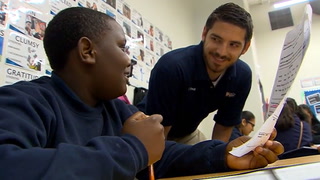
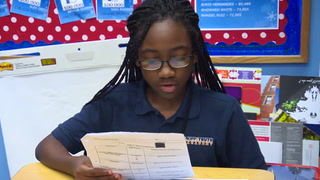

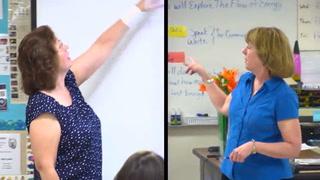
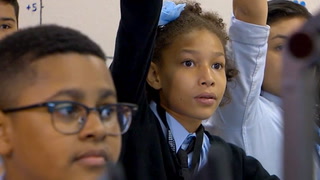
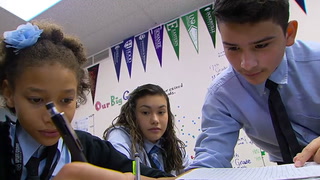
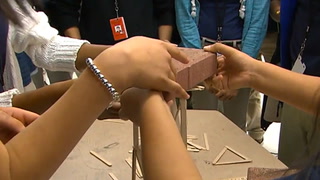
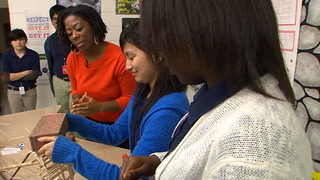
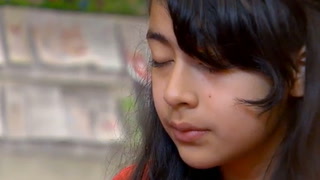
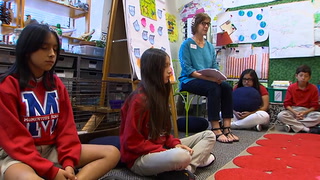
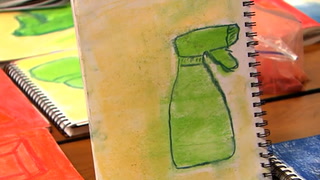
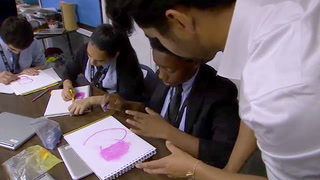
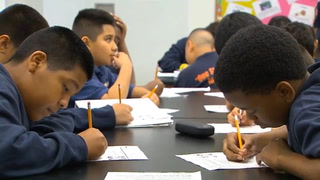
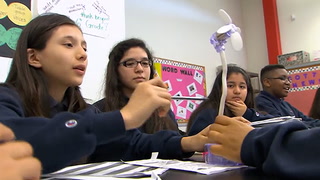









31 Comments
Lan Pham May 28, 2020 11:06am
This video is very helpful for new teachers to learn more about how to help students deepen their understanding of a piece of literature and develop their speaking and listening skills. Indeed, literature circles help students not only understand the plot and character development better but only boost their language skills.
In order to make the group discussion and student learning more effective, Mr. Knoll has prepared a STEAL template for the students to work on. In this way, students develop their analytical skills based on text evidence and build their confidence in expressing their thoughts and opinions. It is essential that students work on one chapter at a time so that the discussion will go deeper with analysis, inferences, and conclusion.
Moreover, it is clear to see that Mr. Knoll runs the literature circles smoothly. Students understand what they have to do in detail and what the expectation is. It is because Mr. Knoll makes it clear to them with a STEAL template and explicit explanation. Undoubtedly, his students have practiced literature circles so often that they can tell clearly and exactly what the word STEAL stands for and what they have to work on.
Janelle Salgado Mar 31, 2020 4:21pm
I like how he has the numbers on the wall so student's already know their role.
enrique black Mar 5, 2018 10:37pm
denise jeffers Nov 13, 2017 8:42pm
Reyna Lopez Aug 30, 2017 4:06pm